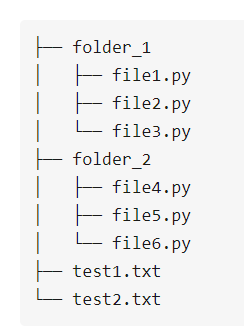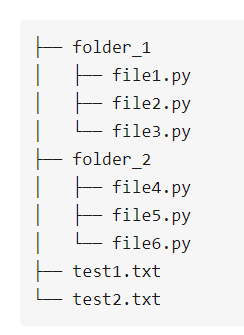Python os.walk遍历目录树
假定你希望对某个文件夹中的所有文件改名, 包括该文件夹中所有子文件夹中的所有文件。也就是说, 你希望遍历目录树, 处理遇到的每个文件。写程序完成这件事,可能需要一些技巧。 好在, Python 提供了一个函数, 替你处理这个过程。
import os
for dirpath, dirname, files in os.walk('.'):
print(f'Found directory: {dirpath}')
for file_name in files:
print(file_name)
os.walk()函数被传入一个字符串值,即一个文件夹的路径。
你可以在一个 for循环语句中使用 os.walk()函数,遍历目录树, 就像使用 range()函数遍历一个范围的数字一样。不像 range(),os.walk 的返回值是一个生成器(generator),也就是说我们需要不断的遍历它,来获得所有的内容, os.walk() 在循环的每次迭代中,返回 3 个值:
- 当前文件夹名称的字符串。
- 当前文件夹中子文件夹的字符串的列表。
- 当前文件夹中文件的字符串的列表。
所谓当前文件夹,是指 for 循环当前迭代的文件夹。程序的当前工作目录,不会因为
os.walk()而改变。
如果我们有如下的文件结构:
a -> b -> 1.txt, 2.txt
c -> 3.txt
d ->
4.txt
5.txt
for (root, dirs, files) in os.walk('a'):
#第一次运行时,当前遍历目录为 a
所以 root == 'a'
dirs == [ 'b', 'c', 'd']
files == [ '4.txt', '5.txt']
。。。
# 接着遍历 dirs 中的每一个目录
b: root = 'a\\b'
dirs = []
files = [ '1.txt', '2.txt']
# dirs为空,返回
# 遍历c
c: root = 'a\\c'
dirs = []
files = [ '3.txt' ]
PS : 如果想获取文件的全路径,只需要
for f in files:
path = os.path.join(root,f)
# 遍历d
d: root = 'a\\b'
dirs = []
files = []
遍历完毕,退出循环
import os
for dirpath, dirname, files in os.walk('.'):
print(f'Found directory: {dirpath}')
for file_name in files:
print(file_name)
在每次迭代中,会打印出它找到的子目录和文件的名称:
Found directory: .
test1.txt
test2.txt
Found directory: ./folder_1
file1.py
file3.py
file2.py
Found directory: ./folder_2
file4.py
file5.py
file6.py

